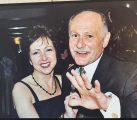- Local Survivor registry
- GRETA HERCKY
- Local Survivor registry
- GRETA HERCKY
Survivor Profile

GRETA
HERCKY
(1912 - 1972)
PRE-WAR NAME:
GRETA NETL
GRETA NETL
PLACE OF BIRTH:
ZITTAU, GERMANY
ZITTAU, GERMANY
DATE OF BIRTH:
APRIL 21, 1912
APRIL 21, 1912
LOCATION(s) BEFORE THE WAR:
ZILINA CZECHOSLOVAKIA
ZILINA CZECHOSLOVAKIA
LOCATION(s) DURING THE WAR:
WOODS OF CZECHOSLOVAKIA
WOODS OF CZECHOSLOVAKIA
STATUS:
SURVIVOR, REFUGEE
SURVIVOR, REFUGEE
RELATED PERSON(S):
ERNEST HERCKY - Spouse (Deceased),
HANUS NETL, Brother (Deceased),
IVAN (NOACH) HERCKY, Son - Son (Deceased),
PETER HERCKY - Son,
DEBORAH HERCKY - Daughter-in-law,
SARI HERCKY HUTCHEN - Granddaughter,
RACHEL HERCKY LINNEWIEL - Granddaughter,
NOAH HERCKY - Grandson
-
BIOGRAPHY BY Nancy Gorrell
Greta Netl, born April 1912 in Zittau, Germany, a town bordering on Poland and Czechoslovakia met her future husband, Ernest Hercky, before the war broke out. According to Peter Hercky in his interview, his mother was six year younger than his father and very attractive. He does not know how they met or when they married. Peter relates that his mother never talked about her Holocaust experiences. Nevertheless, he does know how his parents got notification to turn up at the train station for deportation. They were living in Zilina. Zilina did not have a ghetto. “My father knew this was not going to be deportation to just a work camp.” My father picked up my mother, my brother, my aunt and uncle, and they all went into the woods to hide. They lived in the woods with the help of others for the remainder of the war. Miraculously, none of them were captured and they all survived. Peter remembers his father talking about the experience, but as a young child, he can’t remember the details of how they survived. “When we were living in Israel, every other person had a tattoo. But my father didn’t have one because he hid out. He would say to me he would tell me about it when I got older.”
After the war, his mother and father went back to Zilina. Fortunately, the city of Zilina was not impacted by the war. Greta’s first child, Peter, was born on August 3, 1946. The Herckys lived in Zilina until 1949 when they emigrated to the new state of Israel. They settled in Kiryat Motzkin between Haifa and Acre, living in a tent and then an apartment. Greta and Ernest lived in Israel from 1949-1956 until an uncle, Theodore Hercky, sponsored the family to come. They settled in Newark, New Jersey where their son, Peter grew up. Greta became a housewife and a factory worker. Ernest husband worked as a chemist in the diamond district for 15 years.
Editor’s Note:
Refer to Historical Notes Below for Zittau
-
SURVIVOR INTERVIEW:
ERNEST AND GRETA HERCKY INTERVIEW WITH PETER HERCKY, SON
Date: June 27, 2017
Location: Hercky Residence
Interviewer: Nancy Gorrell
Q: Describe your father’s background.
My father was born in Topolcany, Czechoslovakia. He prided himself as a gentleman. He was always well dressed, and based on his dress, he was well-off. He was one of 11 children. My father was a child of the second wife of my grandfather. Topolcany was a city of some size. I have no idea what my father or grandfather did for a living. After the war, they moved to Zilina. There, they were part of society. There was no ghetto in Zilina.Q: Was he a religious man?
No.Q: Did he speak about any anti-Semitism before the war?
Yes. The way he would tell the story, neighbors would be friendly, but as soon as the Nazis came in, they didn’t hesitate to turn in the Jews. The Czechs wouldn’t hesitate to turn in Slovaks.Q: What was his education like?
He was a chemist, so he must have had some education. In Israel, he worked as a chemist and when he came to the United States, he worked as an assayer on 47th street, the diamond district.Q: How and where did your parents meet?
My mother Greta, was born in Zitau, Germany. I have no idea how they met, but they got married before the war began. My mother did not talk about any of her Holocaust experiences.Q: What happened to your father when the war began?
The story was they got notification to turn up at the train station for deportation. My father knew this was not going to be deportation to just a work camp. He picked up my mother, my brother, my aunt and uncle and instead of going to the train station, they all went into the woods, and they lived there with the help of others for remainder of the war. None of them was ever captured. They all survived.Q: Did your father ever speak about how they survived?
Constantly, but I don’t remember much detail. I do remember catching him in Israel reading a book about the Holocaust. I could never understand why he was looking at that book. When we were living in Israel, every other person had a tattoo. But my father didn’t have one because he hid out. He would say he would tell me about it when I got older.Q: What happened to your father and his family in the post war period?
He went back to Zilina to either open or purchase a battery factory. I don’t know exactly which. The city of Zilina was not impacted by the war. I was born on August 3, 1946. My family lived there until 1949 when we left for Israel.Q: How and why did your family go to Israel?
My family left because the communists were taking over Czechoslavakia.Q: How did your father and mother adjust to life in Israel?
My family settled in a town called Kiryat Motzkin between Haifa and Acre. I was three years old at the time. We stayed a few days in a tent. And then I remember we moved to an apartment. My father’s first job in Israel was paving roads (refer to photograph). He wasn’t much of a Zionist, and he resented having to pave roads after owning a factory. He was looking to move to the United States right from the beginning.Q: How long did your family live in Israel?
We lived there until I was in 4th grade, from 1949 to 1956.Q: Where did your parents go after living in Israel?
I had an uncle living in the US. He was one of my father’s brothers, Theodore Hercky, and he sponsored us.Q: Where did you settle in the United States?
We settled in Newark, New Jersey in 1956. I was ten when we arrived. The biggest culture shock for me was television and movies. We didn’t have that in Israel. My uncle had a box in his living room. I learned the English language in six months, but at the same time, I forgot my Hebrew. My father always worked as a chemist in the States. He worked in the diamond district for 15 years. My mother was a factory worker and a housewife.Q: What happened to your brother?
My brother was in the Israeli army when we came to the United States. After the army, he came to join us in the US. Then after the six day war, he went back to visit Israel and decided he wanted to stay there for good. He took his whole family back with him to live in Israel.Q: What do you think your father’s message would be to future generations?
He was a cynic. He would probably say, “Everyone has the potential to be anti-Semitic.” -
HISTORICAL NOTES:
Zittau is a city in the south east of the Free State of Saxony, Germany, very close to the border tri-point of Germany, Poland, and the Czech Republic. It is part of the District of Görlitz.
-
Sources and Credits:
Credits:
SSBJCC Survivor Registry Interview with Peter Hercky, June 27, 2017, Interviewer: Nancy Gorrell; Biography by Nancy Gorrell; Digital historic and family photographs donated by Peter Hercky.






